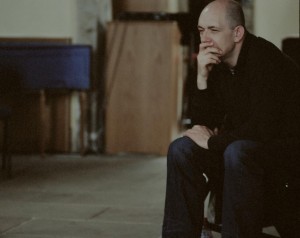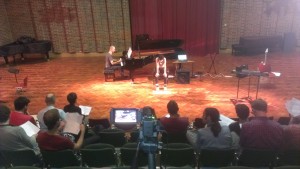Interview with Laurence Crane
In the third and final of a series of interviews by postgraduate students with eminent composers who have come to visit us at Southampton Alex Glyde-Bates asks Laurence Crane some questions:
 Alexander Glyde-Bates (AGB): Your music seems to have more in common with the minimalist school of artists (Dan Flavin and Donald Judd) — a focus on letting unaltered objects simply exist as they are — rather than the process-driven musical minimalism of Reich, Riley or Glass. Would you say that is a fair assessment, or do you see any similarity as being purely coincidental?
Alexander Glyde-Bates (AGB): Your music seems to have more in common with the minimalist school of artists (Dan Flavin and Donald Judd) — a focus on letting unaltered objects simply exist as they are — rather than the process-driven musical minimalism of Reich, Riley or Glass. Would you say that is a fair assessment, or do you see any similarity as being purely coincidental?
Laurence Crane (LC): Yes, in general that is a fair assessment but the similarity is also coincidental in the sense that my personal starting point was made without any proper knowledge of the work of those visual artists – Flavin and Judd – or of any other similar artists.
AGB: Do you think that any of those artists, or any other related artists, have influenced or prompted aspects of your music along the way, or do you see your work as a composer as something very independent and individual to you? I ask as in another recent interview you cited ‘Cinema and visual art, for structural and aesthetic reasons’ as non-musical influences (http://www.sinfinimusic.com/uk/features/interviews/composer-interviews/laurence-crane), and I was curious as to how far you think that influence goes (if at all) in your work and artistic outlook?
LC: In the particular interview that you mention I think I was trying to articulate the fact that I feel more aesthetic connection with certain aspects of film and visual art than I do with anything in the literary or dramatic arts. Although I have to say that I find it difficult retrospectively to work out whether those influences come directly from film and visual art themselves or whether they are more indirect, perhaps as a result of me having been interested in music that also has similarities and kinships with those art forms…if that makes sense!…in other words, the influence may have been far more subconscious.
AGB: Have you always been instinctively drawn to a (for lack of a neutral term) ‘limited-intervention’ musical aesthetic, or was it something that you consciously decided to pursue at some point early on?
LC: A combination of the two, i.e. I think I consciously decided to pursue it as a result of being instinctively drawn to it! I’m not too sure about the description ‘limited-intervention’ though…that particular wording suggests to me an aesthetic stance that allows a significant amount of influence from things that are not necessarily under my control, in both the compositional process and in the act of performance…I am talking about chance procedures or some sort of indeterminate element here…This is almost always not the case in my work as feel I ‘intervene’ a great deal…I recognise what you are attempting to describe, I just don’t agree with the terminology that you’ve employed!
AGB: Maybe that wasn’t the best choice of words on my part, but I’m interested to know how you would feel most happy describing your approach?
LC: More often than not I try and avoid being too specific in describing my approach as it’s not always that clear cut and to be too definite about things leaves no room for flexibility or ambiguity. I’m happy for people to have a go themselves at describing my approach…it’s interesting when this happens.
But perhaps I can return to your original question and say that an interest in spare and reduced material was something that was there very early on…in my teenage years…and that interest became more focused and defined when I came into contact with the music of certain composers…most notably Skempton, Feldman, Satie…when studying music as an undergraduate.
AGB: In that case, would you say you had, to paraphrase a famous Feldman anecdote, no desire ‘to push the sounds around’, to arrange the sounds in time and space, but not to manipulate them to be anything other than what they are?
LC: In general I feel empathy with this statement of Feldman’s. But again, for me things are not entirely clear-cut and I think it’s too neat to give you a definitive yes or no answer to this question. I say this partly because some recent works of mine have shown a tendency to try and make a more through-composed and directional structure and are consequently somewhat less static than some of my earlier pieces. I am interested in trying different things and not restricting myself to one method, approach or manifesto.
AGB: Do you think you can identify when or where that instinctive draw came from, or has it always been there as far as you can remember?
LC: I think I might have ended up semi-answering this a few paragraphs ago! An extremely important and revelatory moment for me was hearing the early piano music of Howard Skempton for the very first time; this was in 1980 or 1981.
AGB: Your name is quite frequently associated with the ensemble Apartment House and you have also had your piano works recorded by Michael Finnissy, do you find working with specific performers alters your compositional approach to a specific work, or do you see your compositional process always independent from such earthly concerns?
LC: In my experience, the process of composing is always subject to some sort of exterior influence from practical considerations and these considerations are often to do with the specific performers that one is writing for. I’ve been extremely fortunate to have worked with many wonderful performers and groups over the years, including the two that you mention. But for me this situation took a long time to develop. I think there is a very important distinction to make between, firstly, a situation where the interest of the performer is engaged simply because of the particular qualities of the composer’s work and, secondly, the composer consciously making decisions about developments in their work that are made specifically to interest certain performers in their work. The second of these situations is not desirable because it seems to me that there is something dishonest and phoney about it.
AGB: The majority of your works seem to all have either abstract titles, or titles that reference their dedicatees or first performers. Occasionally, however, you write works with titles like John White in Berlin or Old Life Was Rubbish, should we read more into these particular works?
LC: No. You should read exactly the same amount into each piece whatever the title is!
Laurence Crane was the guest composer at our Annual Composer ‘Get-together’, which took place this week. It was a great couple of days in which our postgraduate composers worked with Laurence, dancer Shila Anaraki and pianist Mark Knoop. Here is a picture from on of the workshops:

